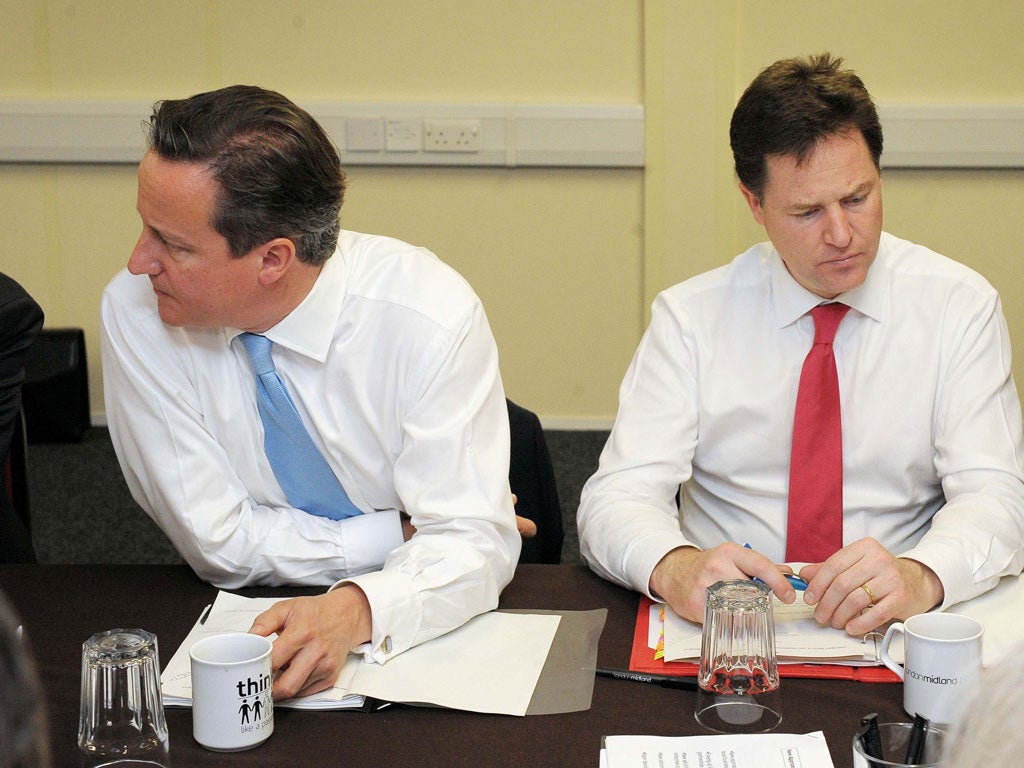'Get tough on Tories' urge Clegg activists
Tensions rise as party rank-and-file is enraged by failure of Lords reform

Liberal Democrat activists are to urge Nick Clegg to "divorce" their coalition partners in revenge for Tory backbenchers forcing him to ditch flagship plans for Lords reform.
Constituency parties are preparing critical motions to put before the Lib Dem conference next month demanding an uncompromising response to the political chicanery that killed off one of the central elements of their constitutional reform programme.
At least three local parties are expected to call for a complete split from the Tories, while several more will demand that Mr Clegg take a tougher line in defence of Lib Dem policies, a senior party source said.
He added: "We have been warned that a few will want a split, meaning the end of the coalition. We have heard that sort of thing before, but the past week has given people another reason to advertise their concerns."
"My [constituency] party has already drafted a resolution saying they want us to unhook ourselves from the Conservatives," said one MP yesterday. "It wouldn't be my choice, but they're fizzing about us losing Lords reform. There is a lot of talk about divorce, but at the very least they want Nick to start playing hardball."
Details of the growing grass-roots pressure for reprisals against the Tories came as a Lib Dem MP claimed the party should go further with its retaliation, and block a key Conservative policy. "Members and activists are clearly annoyed that the Tories have broken their contract with us," the Torbay MP Adrian Sanders said. "We should respond by withdrawing support for the council tax benefit changes that are going to hurt hundreds of low-income working families in my constituency and others where there are large numbers of pensioners whose council tax benefit will be protected at the expense of non-pensioner claimants."
The simmering tensions at the heart of the coalition came to the boil last week when Mr Clegg abandoned his Lords reform ambitions, claiming the Conservatives "broke the coalition contract".
A commitment to reform the upper house was included in the coalition agreement, signed by Mr Clegg and Mr Cameron after the general election in May 2010. The Lib Dems set out plans to halve the total number of peers to 450, and require 80 per cent of them to be elected.
However, the programme was opposed by many Tory MPs, and more than 90 of them defied the Government when the issue was put to a vote in July. After it became clear that the Prime Minister could not force his MPs to toe the line, Mr Clegg chose to drop his cherished Lords blueprint, claiming he would rather shelve the plans than allow them to die a "slow death".
However, in retaliation for the disappointment, Mr Clegg also announced that his MPs could not now support Conservative-driven changes to Commons boundaries in 2015 – a move that raises the prospect of Lib Dem ministers lining up to vote against their own Government.
MPs and party officials claim the robust approach has won Mr Clegg renewed support among Lib Dems who had previously feared he was being dominated. But a number of party figures warned that the leadership must show greater resolve in pursuing a Lib Dem agenda.
Mathew Hulbert, a Liberal Democrat borough councillor and member of the Liberal Left group, said he was pleased the leadership had "finally shown that it has some balls and will not be messed around with".
But he added: "It looks now as though we will be going through a term in government with no form of constitutional reform to show at the end of it. People like me have never made any secret of the fact that we didn't want a coalition with the Conservatives, but there will be more complaints and motions about it at conference this year. It will be very difficult for the leadership."
Julian Lewis, a Tory MP and long-standing opponent of the coalition, said he had no sympathy with Lib Dems whose plans for constitutional reform were dashed. He said: "I fully understand their frustration that their schemes to strengthen their position in the Commons and the Lords have come to nothing, but I am delighted that this has happened. I am no supporter of coalition, but if a party enters such an arrangement, it has to accept that it cannot get its way all the time and not complain. If they want to go their separate way to oblivion, that is their choice."
But the Lib Dem MP John Pugh urged his leader not to become distracted by constitutional questions and instead to "muster every sinew in an effort to kick-start the economy". He added: "Strains in the coalition will only become seriously problematic if sharp differences on economic policy emerge.
"It has to be remembered that the original pre-coalition preference of the Lib Dems was for a slower rate of deficit reduction. With the blessing of hindsight it is hard to argue that Vince Cable's original judgment was wrong."
A Lib Dem spokesman said yesterday that the party faced complaints from the ranks before every conference.
He said: "The bottom line is that some people would prefer to be in opposition but not get things done. For those who think we are not getting anything out of coalition, they should look at our manifesto promise to give the poorest people a fairer tax deal and see what we've achieved."
Subscribe to Independent Premium to bookmark this article
Want to bookmark your favourite articles and stories to read or reference later? Start your Independent Premium subscription today.

Join our commenting forum
Join thought-provoking conversations, follow other Independent readers and see their replies